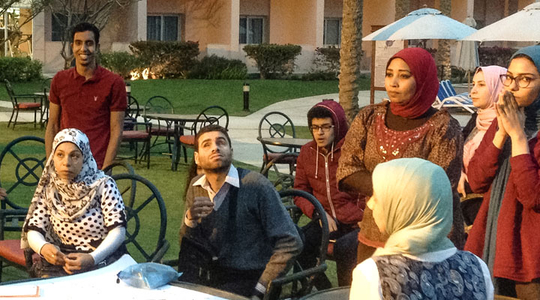The way a society takes its decisions characterizes it significantly and is directly linked to the realization of the values: humanity, equality, honesty, social justice and especially freedom. This simulation game provides a save space to experiment with different decision making mechanisms. The participants are on a fictitious train-ride during which they have to decide in which direction to continue, at every junction/station. Moreover, it helps the participants to understand the different social needs in their community. This is the third game developed by SimClub members that exposes Egyptian youth in different Egyptian governorates to make informed decisions regarding their participation in political life. During the evaluation phase participant reflect on questions like a) What makes a good decision? b) What is needed to make a good decision? c) To what extent individuals participate in political life in Egypt, and what mechanisms do they use?
Scenario & Procedure
The scenario of the simulation game is a train ride, where the passengers (participants) are distributed over three (3) wagons; each one representing a social stratum. Al passengers have to fulfill their different social needs and thus want to pass by different stations. After each stop, after satisfying their needs, the participants have to take a follow-up decision on how to continue the train-ride. At each stop different decision making mechanisms are in place thatrequest action of the participants and make them experience the pros and cons of each mechanism. That way democratic principles can be experienced and are challenged.
Objectives
The main objective is to raise the awareness about democratic decision-making mechanisms. In this regard the simulation game shows clearly the importance and value of each single vote in the case of elections. Furthermore, it highlights the crucial function of social and political participation. It also makes participants understand that active citizenship goes beyond criticizing political decisions and governing systems, to include fostering self-education and self-empowerment to become effective agents of change, either through voting, or leading community development initiatives.
Learning Goals
- Understanding and practicing decision-making in groups
- Conveying the importance of an active citizenry for peaceful living together
- Developing a culture of inclusiveness between different social classes.Increasing individual ability to analyze existing conflicts and better expect/accommodate future conflicts.


